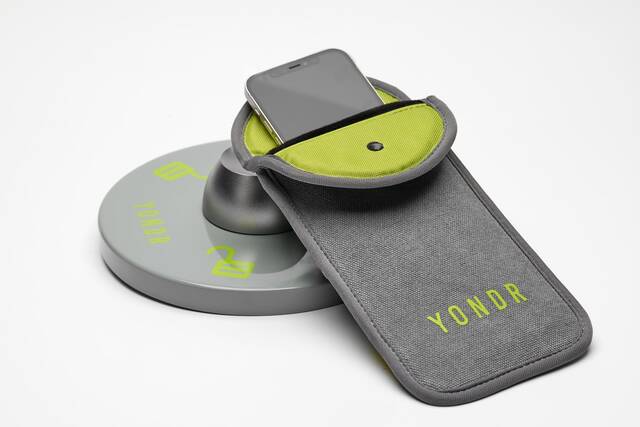As of Thursday, people attending the Luzerne County Court of Common Pleas proceedings must turn off their cell phones and smart watches and put them in locked pouches, as stated in a policy by President Judge Michael T. Vough.
County Court Administrator Paul Hindmarsh explained that the aim is to prevent disruptions during court proceedings.
Hindmarsh mentioned instances of devices ringing and people trying to record audio or images during hearings and trials, which led to the new policy.
Although there are no specific statistics on how often this happens, Hindmarsh stated that disruptions have been increasing, despite warning signs. He noted that more courts in the country are adopting similar measures.
The new procedure applies to both the courthouse on River Street in Wilkes-Barre and the nearby Bernard C. Brominski Building, which houses courtrooms and offices associated with the county court.
Before explaining how the new procedure will work, here are those exempted:
• County employees and current/former judges
• Those visiting other areas of the courthouse, such as the district attorney’s office, prothonotary/clerk of courts office, sheriff’s department, GIS/mapping department, protection-from-abuse office, court administration, county credit union, Center City Cafe, and county council office/meeting room
• Federal/state/county/municipal law enforcement personnel, including probation and parole officers, who can show proper credentials upon request
• Attorneys with their Bar Association card or Pennsylvania Bar license, and any member of their trial support staff
• Citizens with a current jury summons or a juror’s badge
• Individuals with disabilities as defined by the Americans with Disabilities Act that necessitate electronic devices for communication, with proper written authorization
• Media personnel showing proper credentials upon request
Participants in adoption proceedings, swearing-in ceremonies, weddings, and similar events are allowed to use their devices to capture the occasion.
A county judge also has the authority to grant other exceptions.
Procedure
Excluding those meeting these exceptions, visitors to both buildings must turn off their cell phones and smart watches and place them in a lockable pouch at the security station.
Visitors will keep hold of the pouch.
Upon leaving the building, the pouch will be unlocked by holding it up to an unlocking base. After removing the devices, the pouch must be given back to security.
The county sheriff’s department, which manages security stations, will handle the distribution and collection of the lockable pouches.
Each courtroom will have a device to unlock a pouch if necessary.
Purchase of devices
The court administration bought the pouches and associated equipment for $25,955 from Yondr Inc., as per the contract.
Hindmarsh confirmed that there are funds available for the purchase.
According to the contract:
The purchase includes 450 pouches and 14 unlocking bases.
Yondr, based in Los Angeles, California, sent a letter to the court confirming that its pouch and system are the only product of its kind. The product is used in various places, including courtrooms, schools, events, workplaces, and other settings, as stated on its website.
According to its website, the pouches are used in courtrooms to prevent unauthorized recording or dissemination of sensitive proceedings, maintain decorum and professionalism, and protect the privacy of jurors, witnesses, and victims, thus reducing the risk of harassment and intimidation.
The company stated, "Mobile phones are causing problems in the courtroom, with hidden recording and intimidation of witnesses increasing. Yondr offers a more secure and respectful environment for legal proceedings while upholding the integrity of the justice system."
Hindmarsh mentioned that in the Bernard C. Brominski Building family court, where domestic relations are handled, accommodations will be made if visitors need to temporarily access their devices for necessary data retrieval, like confirming a payment.



